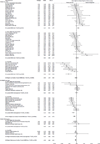Effect of low-fat diet interventions versus other diet interventions on long-term weight change in adults: a systematic review and meta-analysis
- PMID: 26527511
- PMCID: PMC4667723
- DOI: 10.1016/S2213-8587(15)00367-8
Effect of low-fat diet interventions versus other diet interventions on long-term weight change in adults: a systematic review and meta-analysis
Abstract
Background: The effectiveness of low-fat diets for long-term weight loss has been debated for decades, with many randomised controlled trials (RCTs) and recent reviews giving mixed results. We aimed to summarise the large body of evidence from RCTs to determine whether low-fat diets contribute to greater weight loss than participants' usual diet, low-carbohydrate diets, and other higher-fat dietary interventions.
Methods: We did a systematic review and random effects meta-analysis of RCTs comparing the long-term effect (≥1 year) of low-fat and higher-fat dietary interventions on weight loss by searching MEDLINE, Embase, Cochrane Central Register of Controlled Trials (CENTRAL), and Cochrane Database of Systematic Reviews to identify eligible trials published from database inception up until July 31, 2014. We excluded trials if one intervention group included a non-dietary weight loss component but the other did not, and trials of dietary supplements or meal replacement drink interventions. Data including the main outcome measure of mean difference in weight change between interventions, and whether interventions were intended to lead to weight loss, weight maintenance, or neither, were extracted from published reports. We estimated the pooled weighted mean difference (WMD) with a DerSimonian and Laird random effects method.
Findings: 3517 citations were identified by the search and 53 studies met our inclusion criteria, including 68 128 participants (69 comparisons). In weight loss trials, low-carbohydrate interventions led to significantly greater weight loss than did low-fat interventions (18 comparisons; WMD 1·15 kg [95% CI 0·52 to 1·79]; I(2)=10%). Low-fat interventions did not lead to differences in weight change compared with other higher-fat weight loss interventions (19 comparisons; WMD 0·36 kg [-0·66 to 1·37; I(2)=82%), and led to a greater weight decrease only when compared with a usual diet (eight comparisons; -5·41 kg [-7·29 to -3·54]; I(2)=68%). Similarly, results of non-weight-loss trials and weight maintenance trials, for which no low-carbohydrate comparisons were made, showed that low-fat versus higher-fat interventions have a similar effect on weight loss, and that low-fat interventions led to greater weight loss only when compared with usual diet. In weight loss trials, higher-fat weight loss interventions led to significantly greater weight loss than low-fat interventions when groups differed by more than 5% of calories obtained from fat at follow-up (18 comparisons; WMD 1·04 kg [95% CI 0·06 to 2·03]; I(2)=78%), and when the difference in serum triglycerides between the two interventions at follow-up was at least 0·06 mmol/L (17 comparisons; 1·38 kg [0·50 to 2·25]; I(2)=62%).
Interpretation: These findings suggest that the long-term effect of low-fat diet intervention on bodyweight depends on the intensity of the intervention in the comparison group. When compared with dietary interventions of similar intensity, evidence from RCTs does not support low-fat diets over other dietary interventions for long-term weight loss.
Funding: National Institutes of Health and American Diabetes Association.
Copyright © 2015 Elsevier Ltd. All rights reserved.
Conflict of interest statement
Conflicts of interest statement
Drs. Tobias, Chen, Manson, and Willett have no disclosures.
Figures
Comment in
-
Prescribing low-fat diets: useless for long-term weight loss?Lancet Diabetes Endocrinol. 2015 Dec;3(12):920-1. doi: 10.1016/S2213-8587(15)00413-1. Epub 2015 Oct 30. Lancet Diabetes Endocrinol. 2015. PMID: 26527510 No abstract available.
-
[There are differences in body weight between diets].Semergen. 2016 Oct;42(7):485-487. doi: 10.1016/j.semerg.2016.01.007. Epub 2016 Feb 20. Semergen. 2016. PMID: 26906902 Spanish. No abstract available.
References
-
- Higgins JPTAD, JAC Sterne, editors. Assessing risk of bias in included studies. 2011. Cochrane Handbook for Systematic Reviews of Interventions Version 510 [Internet] 2011 Available from www.cochrane-handbook.org.: The Cochrane Collaboration.
-
- Willett W, Stampfer M, Chu NF, Spiegelman D, Holmes M, Rimm E. Assessment of questionnaire validity for measuring total fat intake using plasma lipid levels as criteria. Am J Epidemiol. 2001;154(12):1107–1112. - PubMed
-
- Begg CB, Mazumdar M. Operating characteristics of a rank correlation test for publication bias. Biometrics. 1994;50(4):1088–1101. - PubMed
Publication types
MeSH terms
Grants and funding
- HL34594/HL/NHLBI NIH HHS/United States
- CA155626/CA/NCI NIH HHS/United States
- R01 DK058845/DK/NIDDK NIH HHS/United States
- UM1 CA176726/CA/NCI NIH HHS/United States
- DK58845/DK/NIDDK NIH HHS/United States
- K01 DK103720/DK/NIDDK NIH HHS/United States
- DK082730/DK/NIDDK NIH HHS/United States
- P30 DK046200/DK/NIDDK NIH HHS/United States
- U54 CA155626/CA/NCI NIH HHS/United States
- K24 DK082730/DK/NIDDK NIH HHS/United States
- R01 HL034594/HL/NHLBI NIH HHS/United States
- R01 HL060712/HL/NHLBI NIH HHS/United States
- DK103720/DK/NIDDK NIH HHS/United States
- DK46200/DK/NIDDK NIH HHS/United States
- CA176726/CA/NCI NIH HHS/United States
- HL60712/HL/NHLBI NIH HHS/United States
- U01 CA176726/CA/NCI NIH HHS/United States
LinkOut - more resources
Full Text Sources
Other Literature Sources
Medical
Miscellaneous



